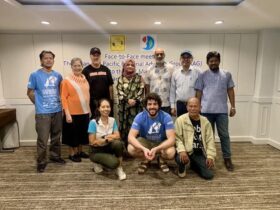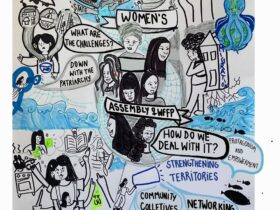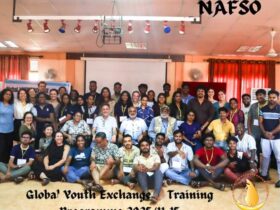Statement made by: Intervention made by International Collective in Support of Fishworkers (ICSF) Made at: FAO Sub-Committee on Fisheries, Thirteenth Session. Hyderabad, India, 20-24 February 2012.
Agenda Item: 5
Thank you, Mr. Chair, for giving us the opportunity to speak. Like other distinguished delegations, ICSF would also like to congratulate you on your election as the Chair of this Session. We hope your knowledge and experience on fish trade would provide guidance to the Sub-Committee to pay greater attention to small-scale artisanal fisheries and international trade.
In spite of seemingly manifest disconnect between artisanal fishing communities and international trade in fish and fishery products, there are several areas of concern and interest to these fishing communities. ICSF, therefore, would like to request FAO that information provided on international trade should be broadened in scope to look at these areas as well, notwithstanding the scope of information and analysis provided by FAO in COFI/FT/XIII/2012/3.
Firstly, there are burgeoning regional trade agreements (RTAs),including free trade agreements and economic partnership agreements, between and amongst developed and developing countries that are a matter of worry for several small-scale fishing communities. ICSF would therefore request FAO to provide information on the impact of such RTAs. Many local fishing communities are concerned that RTAs negatively impact on domestic fish production and domestic fish prices. Whether or not there is substance to such fears need to be examined.
Secondly, ICSF is aware how geographical indications (GI) under trade-related intellectual property rights regime of WTO TRIPS Agreement (Article 22) can be of significant benefit to small-scale fishing communities. Along with emphasizing the need for facilitating application of ecolabels to small-scale fisheries, FAO may also provide information on how GIs can assist small-scale fishery communities in gaining international market access. There are examples from developing countries such as the case of nuoc mam anchovy fish sauce from PhuQuoc, in Viet Nam, that should be collected and disseminated.
Thirdly, it will be useful to have information not only on principal commodities in international trade but also on the status of low-value fish and fishery products, especially in intra-regional trade in Africa and Asia. Intra-regional trade in low-value fish and fishery products are significant for nutritional and food security of the poor in many developing countries and towards meeting the Millennium Development Goal of eradicating poverty and hunger. Catering to intra-regional trade is an area where women play an active role in fish processing and marketing. It is an expanding area of trade between many developing countries.
Fourthly, ICSF would like to seek help of FAO regarding the United Nations agencies that could provide information on trade in fishing vessels, fishing gear, electronic devices like GPS, trade in ornamental fish, including conches and shells, trade in brood stock and post larvae – all areas of concern for small-scale fishing communities, dependent on fishing for a livelihood. We would also like to know if any UN agency is keeping track of food commodity futures trade, especially fish futures trade, that could have grave implications for trade in fish and fishery products.
Fifthly, trade in services is another area that ICSF would like to flag for the attention of FAO. Fishers are recruited from one country to work on board distant water fishing vessels, or in fish processing plants, of another. Environment and food safety services of relevance to fisheries management and food safety standards are rendered through commercial presence that also can be treated under trade in services, under the WTO General Agreement in Trade in Services (GATS). There is, to our knowledge, no information available on trade in services of relevance to fisheries and fishing communities. FAO should pay attention to this area that has implications for trade in fish and fishery products and market access.
Finally, Mr. Chairman, COFI-FT should provide an effective forum for comprehensive consultations not only on all significant technical and economic aspects of international trade in fish and fishery products, but also on social aspects of international trade in fish and fishery products. In this context, with increasing globalization of fish trade, it would be fair and appropriate if FAO also provides information on working and living conditions in the context of international trade, especially impact of international trade of relevance to fisheries, on fishworkers, both men and women, to ensure that decent work of fishworkers is not compromised for short-term benefits.
Last not the least, ICSF would also like to join other delegations in congratulating India in hosting this session of COFI-FT.




Leave a Reply